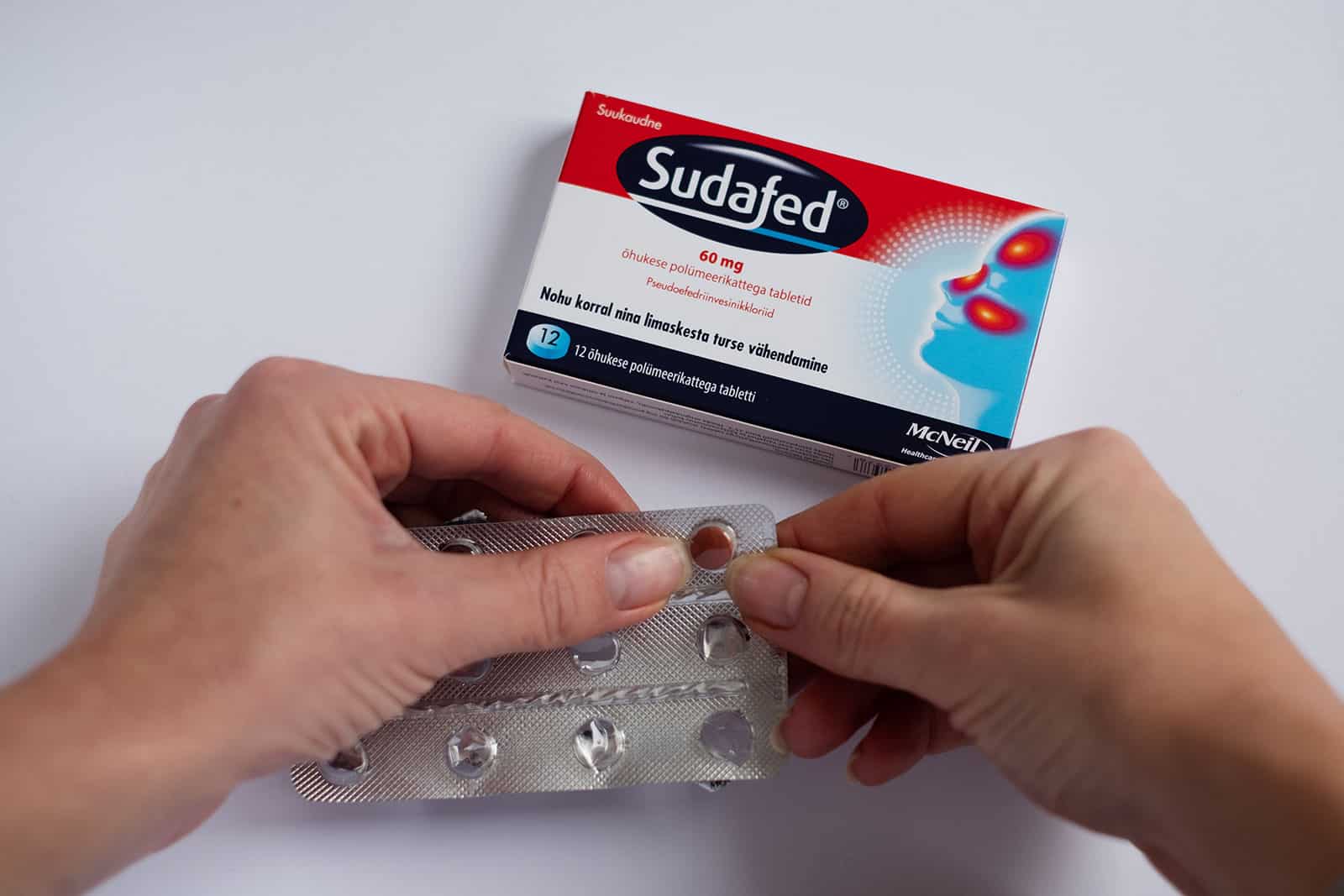
Sudafed and Alcohol: The Risks of Mixing Them Together
Home » Blog » Sudafed and Alcohol: The Risks of Mixing Them Together
As inconvenient as nasal congestion might be, treating it is usually quite simple. You won’t have to search for long to find an effective medication, like Cetirizine, Antihistamines, or Sudafed.
That last one, in particular, offers excellent results. That said, you want to avoid mixing it with other substances, especially alcohol.
If you’ve ever considered taking Sudafed and alcohol simultaneously, this post is for you. It’ll cover how both substances work, how they interact with each other, and more.
Table of Contents
What Is Sudafed?
Sudafed is the brand name for pseudoephedrine, an over-the-counter medication that’s used to treat the common cold, fever, asthma, and sinus pressure. It narrows the blood vessels in your nose to drain the fluids out of them, allowing you to breathe freely.
At first glance, it sounds like a harmless medicine, but there’s more to it than meets the eye. You see, Sudafed is a stimulant. It prompts your body to enter the “fight or flight” mode.
In fact, its prevalent stimulant effects have made it one of the main active ingredients of methamphetamine.
That’s why its purchase is heavily restricted in the U.S. Despite being a generally safe drug, Sudafed can potentially induce common side effects, including:
- High blood pressure
- Blurry vision
- Sweating
- Rapid heartbeat
- Tremors
Ultimately, though, it won’t pose much of a threat as long as you take it alone and in moderation. The real danger is when you combine it with other substances.
How Does Alcohol Affect Your Body?
Many believe that alcohol is a stimulant, as it increases your heart rate and makes you more alert, but that’s a common misconception.
Alcohol is a depressant that targets your central nervous system (CNS), disrupting the neurotransmitters in your brain and slowing down its activity.
That can cause physical, behavioral, and mental changes, but the side effects depend on how much and quickly you consume alcohol.
Short-term side effects of alcohol include:
- Slurred speech
- Vomiting
- Diarrhea
- Headaches
- Upset stomach
- Racing heart
The longer and more intensely you misuse alcohol, the more prevalent and severe its side effects will be. Long-term symptoms include:
- High blood pressure
- Heart problems or strokes
- Disorientation
- Liver disease
- Cancer
- Declining cognitive abilities
- Nerve damage
Can You Take Sudafed With Alcohol Simultaneously?
Sudafed and alcohol aren’t necessarily a dangerous combination, but health experts advise against it as it may lead to unwanted side effects.
Sudafed Can Mask the Effect of Sedatives
As previously established, Sudafed has stimulant effects. That means it can mask the drowsiness that alcohol induces.
While that may seem like an advantage, it can prompt you to consume more alcohol than what’s recommended since you don’t feel intoxicated. This can lead to various health issues, including:
- Higher risk of injuries, fractures, or scarring
- Alcohol poisoning
- Hangover
- Higher risk of violence
Alcohol Can Reduce the Effectiveness of Sudafed
A 2022 study shows that alcohol use, be it moderate or heavy, can result in nasal obstruction, which is what Sudafed aims to treat in the first place.
So, drinking alcohol with Sudafed defeats the purpose of taking the medication. Your symptoms will either take longer to improve or not improve at all.
Additionally, the National Institute of Alcohol Abuse and Alcoholism (NIAAA) states that alcohol misuse can weaken your immune system. That makes it harder for Sudafed to treat the infections that cause nasal congestion.
Both Substances Can Prompt Severe Side Effects
Sudafed and alcohol’s interaction can prompt severe side effects, like increased heart rate, blurry vision, dizziness, and anxiety.
If you struggle with high blood pressure or heart disease, you want to avoid that combination. Both substances, on their own, can raise your blood pressure. So, consuming them simultaneously can cause serious health conditions.
To be clear, these side effects aren’t guaranteed, but they’re still a possibility. They’re particularly common with people struggling with health conditions that make them vulnerable to these issues in the first place.
Why Do People Take Sudafed With Alcohol?
Knowing the potential side effects of mixing Sudafed with alcohol, you might wonder why anyone would choose to take the two together. There are several reasons for that.
Not Being Aware of the Risks
You’re reading this article to learn the potential risks of combining Sudafed and alcohol, but not everyone goes the extra mile. Those people won’t know that the interaction between the two substances can promote dangerous side effects.
Besides, Sudafed containers and alcohol bottles don’t warn people about mixing them together. So, those who haven’t done the research might never know the risks.
Fighting Off Illnesses
Using alcohol to fight off illnesses is a tradition that’s as old as time. A lot of people believe that drinking alcohol when they’re sick relieves the symptoms of the illness.
So, they tend to take alcohol with other medications to improve the symptoms quickly. As previously mentioned, though, that only makes it worse, as alcohol weakens the immune system.
Alcohol Misuse
That’s the most troubling reason for drinking alcohol with Sudafed, but it’s still a common one. A lot of people take Sudafed with alcohol to sedate the drowsiness it induces, increase their alcohol tolerance, and drink more.
Doing so after understanding they’ll face the risk of side effects indicates a severe drinking problem.
How to Consume Alcohol and Sudafed Responsibly?
Yes, just because Sudafed and alcohol can prompt life-threatening side effects doesn’t mean you can’t take them responsibly.
1. Consult a Healthcare Provider
You can ask a healthcare provider if it’s safe for you to consume Sudafed and alcohol simultaneously. They have the necessary knowledge and experience to assess the potential effect of the interaction on your body.
They’ll take your medical history, personal circumstances, and medication usage into consideration to give you personalized medical advice.
So, the next time your doctor recommends using Sudafed to treat your nasal congestion, ask them if you can have a few drinks with it.
2. Drink Alcohol After Sudafed Wears Off
The safest way to consume alcohol and Sudafed without prompting adverse side effects is to wait for Sudafed to get out of your system before drinking.
That way, you’ll be sure the two substances won’t interact, and you won’t deal with hangovers or alcohol poisoning. The time it takes for Sudafed to get out of your system depends on its type.
The average Sudafed takes 3-16 hours. However, Sudafed Sinus has a 12-hour-long effect and takes 5-6 more hours to clear out of your system.
To be safe, you might want to wait around 20 hours before you drink alcohol. Safeguard Sinus Congestion has the longest effect among its variants, lasting about 24 hours.
Like its 12-hour counterpart, it takes 5-6 hours to clear out of your system. So, wait around 30 hours to drink alcohol after taking that variant.
3. Identify Your Limits
You’ve probably consumed alcohol numerous times before. So, you must know your limit, be it one or two glasses a day. When you drink alcohol with Sudafed, don’t go over your limit.
You’ll be tempted to, as the medication will hide your body’s response to alcohol. You’ll feel like it’s not taking a toll on you like it usually does, but that’s not true.
Don’t let that feeling fool you, and limit your alcohol consumption to your average daily intake.
4. Monitor Your Reaction
If you decide to consume alcohol and Sudafed together, you want to monitor how your body is reacting to that combination. Although the side effects may not be immediate, you still want to keep a close eye on any changes your body might be facing.
Unusual disturbances/symptoms should tell you to stop taking both substances together and seek professional help.
How Does Sudafed Interact With Other Substances?
Sudafed and alcohol isn’t the only dangerous combination you can take. There are numerous other substances on the market that can prompt adverse side effects if you take them with Sudafed.
Monoamine Oxidase Inhibitors (MOIs)
Monoamine oxidase inhibitors are sedatives that people take to treat depression and anxiety. Some can even use it to treat Parkinson’s disease.
Taking this medication requires following a strict diet and avoiding specific medication, as it can raise blood pressure if mixed with certain foods and drugs. These drugs include Sudafed.
Combining two medications that prompt high blood pressure can cause serious health issues.
Important note: Unlike alcohol, Monoamine takes a long time to clear out of your system. So, wait at least two weeks before taking Sudafed.
Tricyclic Antidepressants (TCAs)
Tricyclic antidepressants aim to treat depression, anxiety, insomnia, and migraines. It blocks norepinephrine reuptake, which can raise your heart rate.
So, combining tricyclic antidepressants and Sudafed can disrupt your heartbeat, resulting in fatigue, dizziness, and faintness.
If you want to treat nasal congestion while taking TCAs, ask a healthcare professional for a safer substitute.
Caffeine
Caffeine is the most common stimulant in the world. It raises your body temperature, increases your heartbeat, and makes you more alert.
As a drug with stimulant effects, taking Sudafed with caffeine can prompt serious side effects, chief among which is disrupted sleep and high blood pressure.
Final Thoughts
The relationship between Sudafed and alcohol is complex. Both substances have their health benefits and risks. While taking them simultaneously isn’t necessarily risky, it might prompt severe side effects. So, you should consult a healthcare professional before you do it.
If you or your loved ones are mixing both substances because you’re facing an alcohol addiction issue, don’t hesitate to contact us for help.
Published on: 2024-06-09
Updated on: 2024-08-17
